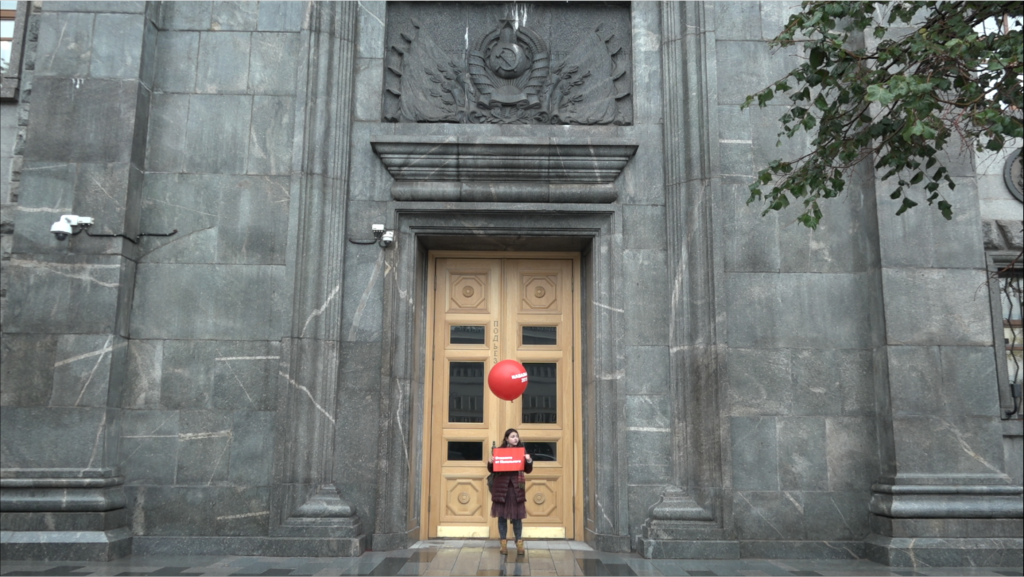Alexandra Dalsbaek is a French-Russian filmmaker based in Moscow. Previously a freelance journalist, she made her documentary feature debut with “Cinderella Syndrome,” which premiered in Moscow and was selected for the 2020 edition of the International Film Festival on Disabilities in Lyon, France.
“We Are Russia” starts screening at the 2021 DOC NYC Film Festival on November 11. The fest runs from November 10-28.
W&H: Describe the film for us in your own words.
AD: “We Are Russia” is a film about a new generation of young Russians desperate to change the system in power.
W&H: What drew you to this story?
AD: A year before the last presidential election in Russia, a huge protest movement motivated by Vladimir Putin’s number one nemesis Alexei Navalny started. I was astonished by the young age of a big part of the crowd taking to Moscow streets, and I decided that I had to document these historical events.
W&H: What do you want people to think about after they watch the film?
AD: I’d like people to be inspired by the courage and determination of the characters of “We Are Russia.”
W&H: What was the biggest challenge in making the film?
AD: The biggest challenge was to gain the trust of some of the characters of the film. It took me about half a year to get proper access to Navalny’s HQ in Moscow because the staff thought I was a pro-Kremlin spy.
W&H: How did you get your film funded? Share some insights into how you got the film made.
AD: My producer, Maria Ibrahimova, and I funded the film ourselves.
W&H: What inspired you to become a filmmaker?
AD: When I moved to Moscow in 2014, I met the characters of my first documentary, “Cinderella Syndrome,” about young artists with Down syndrome and their families. Their stories moved me deeply and I wanted to find a way to document them. I discussed that with Maria, and we decided to make a documentary together about these families despite my lack of filmmaking experience at that time. That’s how I started filming.
W&H: What’s the best and worst advice you’ve received?
AD: The worst advice: Stop filming. You don’t have the funds nor the experience needed.
The best advice: Trust yourself and do it!
W&H: What advice do you have for other women directors?
AD: I’ve heard sometimes in Russia that filming is not for women. [I’ve been told that] “the equipment is too heavy,” and asked, “You don’t have any male colleague to help you?”
The only advice I have is not to listen to these kinds of comments. Just do what inspires you.
W&H: Name your favorite woman-directed film and why.
AD: “Miss Gulag,” directed by Maria Ibrahimova. Maria is not only a great producer, but she’s also a very talented director. She directed her first documentary, “Miss Gulag,” in a women’s prison camp in Siberia, Russia. It is an amazing immersion into the destinies of several Russian women who ended up in one of the most terrible Siberian prisons. When I watched it a few years ago, I understood that I also want to tell people’s stories.
Maria is a very sensitive and passionate director and human being, and she is the person without whom I would never have filmed a single shot.
W&H: How are you adjusting to life during the COVID-19 pandemic? Are you keeping creative, and if so, how?
AD: I’m currently working as a producer and video journalist with France Télévisions, the French national public television broadcaster, and as a journalist — even during COVID-19, the news never stops. We’ve kept doing reports full-time all around Russia since the beginning of the pandemic. It’s more difficult though to keep being creative in this context, but I’m slowly working on two different projects — one is about a former inmate in the Russia Far North, and the other one is about my 90-year-old grandma who used to be a dancer at the Bolshoi theatre in the 1950s-60s.
W&H: The film industry has a long history of underrepresenting people of color onscreen and behind the scenes and reinforcing — and creating — negative stereotypes. What actions do you think need to be taken to make it more inclusive?
AD: I think the Russian documentary world is definitely not inclusive. It’s difficult to talk about what actions should be taken here, [but] first of all, the mentalities should evolve.







